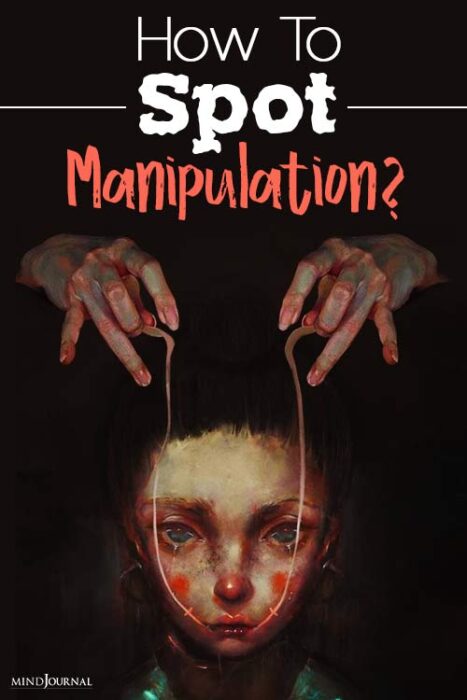In today’s world how to spot manipulation is an essential skill. But if you don’t have a keen radar for spotting deceptive tactics, then this article will surely help you out from being manipulated in the future!
We all want to get our needs met, but manipulators use underhanded methods. Manipulation is a way to covertly influence someone with indirect, deceptive, or abusive tactics.
How to spot manipulation tactics?
Manipulation may seem benign or even friendly or flattering as if the person has your highest concern in mind, but in reality, it’s to achieve an ulterior motive. Other times, it’s veiled hostility, and when it becomes abusive, the objective is merely power. You may not realize that you’re being intimidated.
Read 6 Diversion Tactics Used By Sociopaths, Narcissists and Psychopaths to Manipulate You Into Silence
Manipulative Tactics
Favorite weapons of manipulators are: guilt, complaining, comparing, lying, denying (including excuses and rationalizations), feigning ignorance, or innocence (the “Who me!?” defense), blame, bribery, undermining, mind games, assumptions, “foot-in-the-door,” reversals, emotional blackmail, evasiveness, forgetting, fake concern, sympathy, apologies, flattery, and gifts and favors.

Manipulators often use guilt by saying directly or through implication, “After all I’ve done or you,” or chronically behaving needy and or helpless. They may compare you negatively to someone else or rally imaginary allies to their cause, saying that, “Everyone” or “Even so and so thinks xyz,” or “says xyz about you.”
Some manipulators deny promises, agreements, or conversations, or start an argument and blame you for something you didn’t do to get sympathy and power.
This approach can be used to break a date, promise, or agreement. Parents routinely manipulate with bribery – everything from, “Finish your dinner to get dessert,” to “No video games until your homework is done.”
Manipulators often voice assumptions about your intentions or beliefs and then react to them as if they were true in order to justify their feelings or actions, all the while denying what you said in the conversation.
They may act as if something has been agreed upon or decided when it hasn’t in order to ignore any input or objection you might have.
The “foot-in-the-door” technique is making a small request that you agree to, which is followed by the real request. It’s harder to say no because you’ve already said yes. The reversal turns your words around to mean something you didn’t intend.
When you object, manipulators turn the tables on you so that they’re the injured party. Now it’s about them and their complaints, and you’re on the defensive. Fake concern is sometimes used to undermine your decisions and confidence in the form of warnings or worry about you.
Read Eight Mental Abuse Tactics to watch out for
Emotional Blackmail
Emotional blackmail is abusive manipulation that may include the use of rage, intimidation, threats, shame, or guilt. Shaming you is a method to create self-doubt and make you feel insecure.
It can even be couched in a compliment: “I’m surprised that you of all people you’d stoop to that!” A classic ploy is to frighten you with threats, anger, accusations, or dire warnings, such as, “At your age, you’ll never meet anyone else if you leave,” or “The grass isn’t any greener,” or playing the victim: “I’ll die without you.”
Blackmailers may also frighten you with anger, so you sacrifice your needs and wants. If that doesn’t work, they sometimes suddenly switch to a lighter mood. You’re so relieved that you’re willing to agree to whatever is asked.
They might bring up something you feel guilty or ashamed about from the past as leverage to threaten or shame you, such as, “I’ll tell the children xyz if you do what I want.”
Victims of blackmailers with certain personality disorders, such as borderline or narcissistic PD, are prone to experience a psychological FOG, which stands for Fear, Obligation, and Guilt, an acronym created by Susan Forward.
The victim is made to feel afraid to cross the manipulator, feels obligated to comply with his or her request, and feels too guilty not to do so.
Shame and guilt can be used directly with put-downs or accusations that you’re “selfish” (the worse vice to many codependents) or that “You only think of yourself,” “You don’t care about me,” or that “You have it so easy.”

Codependency
Codependents are rarely assertive. They may say whatever they think someone wants to hear to get along or be loved, but then later they do what they want. This is also passive-aggressive behavior.
Rather than answer a question that might lead to a confrontation, they’re evasive, change the topic, or use blame and denial (including excuses and rationalizations), to avoid being wrong.
Because they find it so hard to say no, they may say yes, followed by complaints about how difficult accommodating the request will be. When confronted, codependents have difficulty accepting responsibility because of their deep shame.
Instead, they deny responsibility, and blame or make excuses or make empty apologies to keep the peace.
Read The Dark Triad Traits and How to Protect Yourself
They use charm and flattery and offer favours, help, and gifts to be accepted and loved. Criticism, guilt, and self-pity are also used to manipulate to get what they want: “Why do you only think of yourself and never ask or help me with my problems? I helped you.” Acting like a victim is a way to manipulate with guilt.
Addicts routinely deny, lie, and manipulate to protect their addiction. Their partners also manipulate for example, by hiding or diluting an addict’s drugs or alcohol or through other covert behaviour. They may also lie or tell half-truths to avoid confrontations or control the addict’s behavior.
Passive-aggression
Passive-aggressive behaviour can also be used to manipulate. When you have trouble saying no, you might agree to things you don’t want to, and then get your way by forgetting, being late, or doing it half-heartedly.
Typically, passive-aggression is a way of expressing hostility. Forgetting “on purpose” conveniently avoids what you don’t want to do and gets back at your partner – like forgetting to pick up your spouse’s clothes from the cleaners. Sometimes, this is done unconsciously, but it’s still a way of expressing anger. More hostile is offering deserts to your dieting partner.
Read Dealing With A Passive-Aggressive Partner
How to Handle Manipulators And Being Manipulated
The first step is to know whom you’re dealing with manipulators know your triggers! Study their tactics and learn their favorite weapons. Build your self-esteem and self-respect. This is your best defense!
Also, learn to be assertive and set boundaries. Read How to Speak Your Mind: Become Assertive and Set Limits or watch the webinar How to Be Assertive. For techniques and scripts for dealing with difficult people, read Dealing with a Narcissist: 8 Steps to Raise Self-Esteem and Set Boundaries with Difficult People.
Contact me at info@darlenelancer.com to join my mailing list and receive a free report “12 Strategies to Handle Manipulators.”
©DarleneLancer2014
Share your thoughts about how to spot manipulation tactics in the comments below!
Written by Darlene Lancer JD, MFT Originally appeared on WhatIsCodependency.com











Leave a Reply
You must be logged in to post a comment.